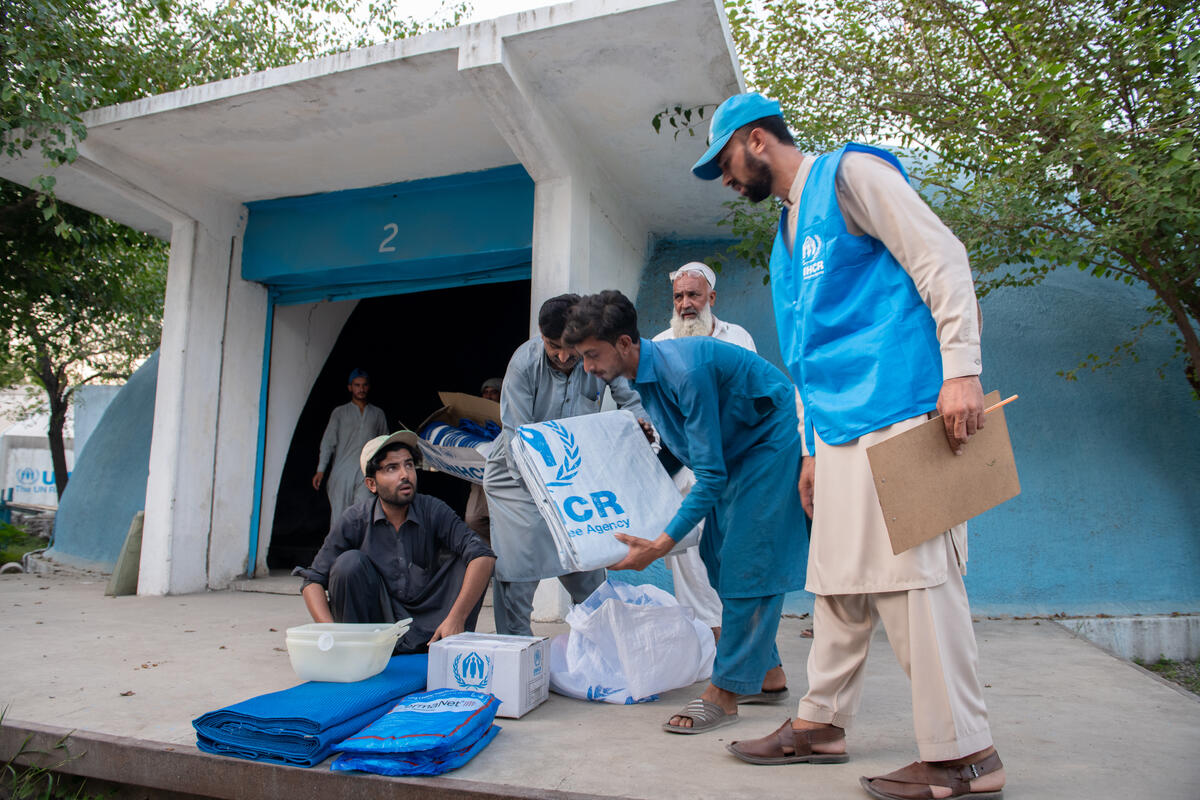UNHCR chief arrives in Georgia; urges donors to help aid effort
UNHCR chief arrives in Georgia; urges donors to help aid effort

TBILISI, Georgia, August 19 (UNHCR) - UN High Commissioner for Refugees António Guterres on Tuesday urged the international community to help the humanitarian aid effort in Georgia soon after arriving in Tbilisi to visit people displaced by the recent fighting and to discuss the situation with officials.
Guterres arrived in the Georgian capital Tbilisi early Tuesday to assess UNHCR's humanitarian operations. He held talks with senior officials, including Georgia's Deputy Foreign Minister Grigol Vashadze and Minister of Reintegration Temuri Yakubashvili. He also visited two collective centres in Tbilisi for newly displaced people with the Minister for Refugees Tamar Martiashvili and Koba Subeliani, coordinator of a parliamentary group on internally displaced people.
During his meeting with Yakubashvili, Guterres called on the international community to mobilize resources for the humanitarian assistance effort in Georgia. The UN refugee agency urgently needs additional funds to ensure continued assistance to the newly displaced population in the Caucasus region. UNHCR's part of the US$58.5 million Georgia Crisis flash appeal, launched on Monday in New York, amounts to US$16 million for the next six months.
After visiting the two collective centres, one holding some 1,200 people in desperate conditions and the other with just 26, Guterres pledged to do all he could to mobilize international assistance. "All those who are in need have to be supported and aid has to be available for them. We have to create conditions on the ground to make it possible to assist them."
His visit coincided with the launch of large-scale aid distribution in western Georgia, which had been inaccessible by road convoy and rail from Tbilisi. UNHCR on Tuesday morning organized a first flight carrying humanitarian aid items to the Black Sea town of Batumi.
Aid supplies for more than 50,000 people have been flown to Tbilisi but very little has reached western Georgia, where some 15,000 displaced are in urgent need of humanitarian assistance. The UNHCR-chartered Boeing 707 that landed in Batumi carried 200 tents, 15,000 blankets, 3,000 kitchen sets and 6,000 jerry cans.
UNHCR, which has six offices in Georgia working on behalf of some 220,000 previously displaced people, is rapidly moving ahead with distribution of aid items. Yesterday, UNHCR distributed aid to some 11,000 internally displaced people (IDPs), including 11,000 blankets, 5,000 kitchen sets and 4,500 jerry cans.
On Tuesday, UNHCR, its partners and volunteers delivered non-food items for 10,000-12,000 people in Tbilisi. Including today's distribution, UNHCR has delivered assistance to 30,000 IDPs since the first arrivals. The number of young Georgians offering to help UNHCR for free is overwhelming. "I am impressed by the number of volunteers, young Georgians who show their deep solidarity with the displaced," said Guterres.
Other UNHCR teams visited 50 collective centres to assess the numbers, needs and living conditions of the newly displaced there. Aid will be distributed based on their findings. A UNHCR emergency team has been deployed to Georgia with 11 specialists so far. They will boost the capacity of the agency's current staff strength in Georgia of more than 50.
The situation on the ground remains volatile and unpredictable. On Sunday, a joint UNHCR and World Food Programme (WFP) convoy managed to enter the town of Gori - just south of the boundary with South Ossetia. This was the first time since the outbreak of the conflict on August 8 that UN agencies were given access to that city. UNHCR delivered aid for some 1,500 people, which included jerry cans, kitchen sets and blankets. The goods were unloaded in a warehouse and will be distributed by local authorities.
UNHCR staff reported Gori to be mostly deserted on Sunday. They came across some 50 to 60 people gathered in the city centre and waiting for assistance. While the damage to the buildings did not appear extensive, there were clear indications of looting of shops and apartments.
After the first UN convoy reached Gori on Sunday, some of those who fled the city were thinking about returning. Those who managed to leave unharmed told UNHCR they were eager to return as soon as possible. But they said they need basic assistance, especially clothes. Others, who have witnessed atrocities and lost relatives during the fighting, are still in shock and too afraid to return for now.
The latest estimates of displacement related to the conflict total more than 158,700 people-based on figures provided by the Georgian and Russian governments. It is reported that up to 30,000 people are displaced within South Ossetia. In addition, some 98,000 people are displaced in Georgia proper, including most of the population of Gori. Russian officials in North Ossetia indicate some 30,000 people from South Ossetia are still in the Russian Federation.
By Melita H. Sunjic in Tbilisi, Georgia









